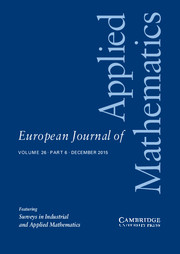Crossref Citations
This article has been cited by the following publications. This list is generated based on data provided by
Crossref.
Wikström, Per‐Olof H.
2014.
Analytical Sociology.
p.
71.
Ibrahim Lazarus, Suleman
2016.
Causes of Socioeconomic Cybercrime in Nigeria..
SSRN Electronic Journal,
Ibrahim, Suleman
2016.
Causes of socioeconomic cybercrime in Nigeria.
p.
1.
Carson, Jennifer Varriale
and
Bartholomew, Brad
2016.
Terrorism Outside the Proverbial Vacuum: Implications for the Moral Context.
Deviant Behavior,
Vol. 37,
Issue. 5,
p.
557.
Hirtenlehner, Helmut
and
Treiber, Kyle
2017.
Can Situational Action Theory Explain the Gender Gap in Adolescent Shoplifting? Results From Austria.
International Criminal Justice Review,
Vol. 27,
Issue. 3,
p.
165.
Brauer, Jonathan R.
and
Tittle, Charles R.
2017.
When Crime is not an Option: Inspecting the Moral Filtering of Criminal Action Alternatives.
Justice Quarterly,
Vol. 34,
Issue. 5,
p.
818.
Pauwels, Lieven J.R.
Svensson, Robert
and
Hirtenlehner, Helmut
2018.
Testing Situational Action Theory: A narrative review of studies published between 2006 and 2015.
European Journal of Criminology,
Vol. 15,
Issue. 1,
p.
32.
Pauwels, Lieven J.R.
2018.
Analysing the perception–choice process in Situational Action Theory. A randomized scenario study.
European Journal of Criminology,
Vol. 15,
Issue. 1,
p.
130.
Noppe, Jannie
2018.
Are all police officers equally triggered? A test of the interaction between moral support for the use of force and exposure to provocation.
Policing and Society,
Vol. 28,
Issue. 5,
p.
605.
Pauwels, Lieven J.R.
2018.
The conditional effects of self-control in situational action theory. A preliminary test in a randomized scenario study.
Deviant Behavior,
Vol. 39,
Issue. 11,
p.
1450.
Hardie, Beth
2020.
Studying Situational Interaction.
p.
23.
Hardie, Beth
2020.
Studying Situational Interaction.
p.
79.
Shadmanfaat, Shamila
Richardson, Dustin A.
Muniz, Caitlyn N.
Cochran, John K.
Kabiri, Saeed
and
Howell, C. Jordan
2021.
Cyberbullying against Rivals: Application of Key Theoretical Concepts Derived from Situational Action Theory.
Deviant Behavior,
Vol. 42,
Issue. 12,
p.
1549.
Barton-Crosby, Jennifer
and
Hirtenlehner, Helmut
2021.
The Role of Morality and Self-Control in Conditioning the Criminogenic Effect of Provocation. A Partial Test of Situational Action Theory.
Deviant Behavior,
Vol. 42,
Issue. 10,
p.
1273.
Teijon Alcalá, Marco
2022.
La dinámica situacional de los actos de infracción de las normas. Un test parcial de la teoría de la acción situacional en el ámbito de la competición deportiva.
Estudios Penales y Criminológicos,
p.
1.
De Buck, Ann
and
Pauwels, Lieven J. R.
2022.
Moral Correspondence, Moral Conflict, and Minor Rule-Breaking in a Randomized Visual Scenario Study: Lessons Learned from a Partial Test of Situational Action Theory.
International Criminology,
Vol. 2,
Issue. 2,
p.
128.
Herman, Shaina
and
Pogarsky, Greg
2023.
Situational Moral Evaluations: The Role of Rationalizations & Moral Identity.
Journal of Research in Crime and Delinquency,
Vol. 60,
Issue. 4,
p.
493.
Kokkalera, Stuti S.
Marshall, Chris E.
and
Marshall, Ineke H.
2023.
Does national moral context make a difference? A comparative test of Situational Action Theory.
International Journal of Comparative and Applied Criminal Justice,
Vol. 47,
Issue. 3,
p.
235.
Rose, Chae
2023.
To Speed or Not to Speed: Applying Situational Action Theory to Speeding Behavior.
Deviant Behavior,
Vol. 44,
Issue. 6,
p.
935.
Kabiri, Saeed
Shadmanfaat, Seyyedeh Masoomeh
Perkins, Robert C.
Wellen, Hadley
Howell, C. Jordan
Cochran, John K.
and
Smith, Hayden
2023.
Aggressive spectators in sporting milieus: A test of Situational Action Theory.
Global Crime,
Vol. 24,
Issue. 3,
p.
195.

